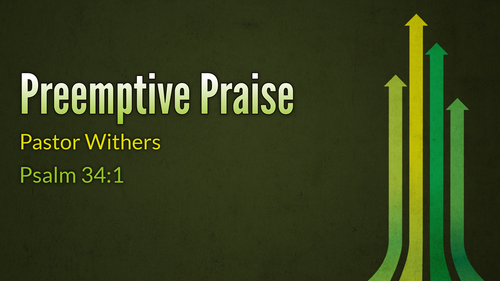Preemptive Praise

In the midst of life's challenges, it's easy to feel overwhelmed and afraid. We often find ourselves facing seemingly insurmountable obstacles, wondering how we'll ever overcome them. But what if the key to victory isn't in our own strength or abilities, but in our praise?
Consider the story of King Jehoshaphat in the Bible. When faced with a massive coalition of enemies threatening to destroy Judah, Jehoshaphat's initial reaction was fear. But instead of succumbing to that fear, he turned to God in prayer and fasting. His words ring true for many of us today: "We don't know what to do, but our eyes are on you."
This moment of vulnerability and dependence on God is crucial. It's when we reach the end of our own resources and abilities that we're most open to God's intervention. And God's response to Jehoshaphat is both comforting and challenging: "The battle is not yours, it's mine."
How often do we try to fight our own battles, relying on our own strength and wisdom? We exhaust ourselves trying to solve problems that are beyond our control. But God invites us to a different approach – to stand still and trust Him.
This doesn't mean we become passive or irresponsible. Rather, it's about recognizing the limits of our own power and placing our trust in God's unlimited power. It's about shifting our focus from the size of our problems to the greatness of our God.
But here's where the story takes an unexpected turn. God doesn't just tell Jehoshaphat and his people to sit back and watch. He gives them a strange battle strategy: march out with praise singers in the front, followed by women and children, with warriors bringing up the rear. In the face of a threatening army, God tells them to lead with praise!
This strategy flies in the face of conventional wisdom. It seems foolish, even dangerous. But it reveals a profound spiritual truth: our praise is a powerful weapon against the enemy.
When we choose to praise God in the midst of our struggles, several things happen:
1. We shift our focus from our problems to God's power and faithfulness.
2. We confuse the enemy, who expects us to cower in fear.
3. We create an atmosphere where God can move on our behalf.
The outcome of Jehoshaphat's obedience is astounding. As the people of Judah marched out praising God, their enemies became confused and turned on each other. The battle was won without Judah even lifting a sword!
This story challenges us to adopt a posture of "preemptive praise" – praising God before we see the victory, trusting that He will come through for us. It's easy to praise God when everything is going well, but true faith is demonstrated when we lift our voices in the midst of the storm.
Think about the three Hebrew young men thrown into the fiery furnace for refusing to bow to an idol. Their response to the king is remarkable: "Our God is able to deliver us... but even if He does not, we will not serve your gods." They praised God regardless of the outcome, and God honored their faith by miraculously saving them.
This kind of faith and praise doesn't come naturally to most of us. Our instinct is to focus on the problem, to worry, to try to control the situation. But we're called to a higher way of living – one that trusts God implicitly and praises Him continually.
The apostle Paul exemplified this attitude when he wrote, "I have learned to be content in whatever circumstances I am." He had experienced both abundance and need, yet he maintained an attitude of praise and trust in God through it all.
It's important to note that this approach to life's challenges doesn't mean we won't face difficulties or that everything will always work out exactly as we hope. The Christian life isn't a guarantee of constant comfort and ease. In fact, Jesus promised His followers that they would face troubles in this world.
However, He also assured us that He has overcome the world. Our praise, then, isn't based on our circumstances but on the unchanging character of God. We praise Him because He is good, faithful, and powerful – regardless of what we're going through.
This kind of praise requires discipline and intentionality. It means choosing to focus on God's goodness even when we don't feel like it. It means filling our minds with Scripture and surrounding ourselves with other believers who can encourage us in our faith.
Practically, this might look like starting each day with a time of worship and thanksgiving, regardless of what challenges we're facing. It might mean turning off the news and turning on worship music when we feel overwhelmed by the state of the world. It could involve keeping a gratitude journal to help us focus on God's blessings even in difficult seasons.
As we cultivate this habit of praise, we'll find that it changes us from the inside out. It renews our minds, strengthens our faith, and gives us a perspective that transcends our immediate circumstances.
Remember, the enemy of our souls wants to keep us focused on our problems, trapped in fear and doubt. But when we lift our voices in praise, we're declaring our trust in a God who is bigger than any challenge we face.
So whatever battle you're facing today – whether it's financial stress, health concerns, relationship struggles, or anything else – remember that the battle belongs to the Lord. Your job is not to fight in your own strength, but to stand firm in faith and lead with praise.
Let your praise be a declaration of faith, a weapon against the enemy, and an invitation for God to move on your behalf. For when we praise, we create an atmosphere where miracles can happen and victories are won.
Consider the story of King Jehoshaphat in the Bible. When faced with a massive coalition of enemies threatening to destroy Judah, Jehoshaphat's initial reaction was fear. But instead of succumbing to that fear, he turned to God in prayer and fasting. His words ring true for many of us today: "We don't know what to do, but our eyes are on you."
This moment of vulnerability and dependence on God is crucial. It's when we reach the end of our own resources and abilities that we're most open to God's intervention. And God's response to Jehoshaphat is both comforting and challenging: "The battle is not yours, it's mine."
How often do we try to fight our own battles, relying on our own strength and wisdom? We exhaust ourselves trying to solve problems that are beyond our control. But God invites us to a different approach – to stand still and trust Him.
This doesn't mean we become passive or irresponsible. Rather, it's about recognizing the limits of our own power and placing our trust in God's unlimited power. It's about shifting our focus from the size of our problems to the greatness of our God.
But here's where the story takes an unexpected turn. God doesn't just tell Jehoshaphat and his people to sit back and watch. He gives them a strange battle strategy: march out with praise singers in the front, followed by women and children, with warriors bringing up the rear. In the face of a threatening army, God tells them to lead with praise!
This strategy flies in the face of conventional wisdom. It seems foolish, even dangerous. But it reveals a profound spiritual truth: our praise is a powerful weapon against the enemy.
When we choose to praise God in the midst of our struggles, several things happen:
1. We shift our focus from our problems to God's power and faithfulness.
2. We confuse the enemy, who expects us to cower in fear.
3. We create an atmosphere where God can move on our behalf.
The outcome of Jehoshaphat's obedience is astounding. As the people of Judah marched out praising God, their enemies became confused and turned on each other. The battle was won without Judah even lifting a sword!
This story challenges us to adopt a posture of "preemptive praise" – praising God before we see the victory, trusting that He will come through for us. It's easy to praise God when everything is going well, but true faith is demonstrated when we lift our voices in the midst of the storm.
Think about the three Hebrew young men thrown into the fiery furnace for refusing to bow to an idol. Their response to the king is remarkable: "Our God is able to deliver us... but even if He does not, we will not serve your gods." They praised God regardless of the outcome, and God honored their faith by miraculously saving them.
This kind of faith and praise doesn't come naturally to most of us. Our instinct is to focus on the problem, to worry, to try to control the situation. But we're called to a higher way of living – one that trusts God implicitly and praises Him continually.
The apostle Paul exemplified this attitude when he wrote, "I have learned to be content in whatever circumstances I am." He had experienced both abundance and need, yet he maintained an attitude of praise and trust in God through it all.
It's important to note that this approach to life's challenges doesn't mean we won't face difficulties or that everything will always work out exactly as we hope. The Christian life isn't a guarantee of constant comfort and ease. In fact, Jesus promised His followers that they would face troubles in this world.
However, He also assured us that He has overcome the world. Our praise, then, isn't based on our circumstances but on the unchanging character of God. We praise Him because He is good, faithful, and powerful – regardless of what we're going through.
This kind of praise requires discipline and intentionality. It means choosing to focus on God's goodness even when we don't feel like it. It means filling our minds with Scripture and surrounding ourselves with other believers who can encourage us in our faith.
Practically, this might look like starting each day with a time of worship and thanksgiving, regardless of what challenges we're facing. It might mean turning off the news and turning on worship music when we feel overwhelmed by the state of the world. It could involve keeping a gratitude journal to help us focus on God's blessings even in difficult seasons.
As we cultivate this habit of praise, we'll find that it changes us from the inside out. It renews our minds, strengthens our faith, and gives us a perspective that transcends our immediate circumstances.
Remember, the enemy of our souls wants to keep us focused on our problems, trapped in fear and doubt. But when we lift our voices in praise, we're declaring our trust in a God who is bigger than any challenge we face.
So whatever battle you're facing today – whether it's financial stress, health concerns, relationship struggles, or anything else – remember that the battle belongs to the Lord. Your job is not to fight in your own strength, but to stand firm in faith and lead with praise.
Let your praise be a declaration of faith, a weapon against the enemy, and an invitation for God to move on your behalf. For when we praise, we create an atmosphere where miracles can happen and victories are won.
